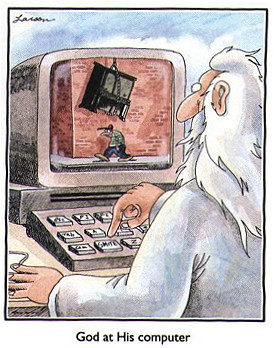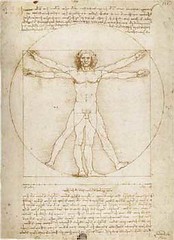I've often thought that bioconservatives who reflexively defer their argumentation to books such as
Frankenstein,
Brave New World and
Gattaca are just being lazy and often unthinking. Even casual critics of pending biotechnologies find it natural and comforting to hold up the classics as shields, acting as if they provided irrevocable proof that a biotech future will lead us to dystopia and that nothing more need be said. In fact, the phrase 'brave new world' has become a cynical descriptor of what many believe to be our inevitably depraved future.
This being said, bioethicists Ruth Levy Guyer and Jonathan D. Moreno recently penned a piece for the
American Journal of Bioethics in which they warn of such an approach to bioethics. In their article,
Slouching Toward Policy: Lazy Bioethics and the Perils of Science Fiction, Guyer and Moreno call for a bioethics that is firmly rooted in reality, pragmatics, empiricism and science. "The charge for bioethicists is obvious, straightforward, and difficult," they write. "Many bioethicists have become skilled in the language of philosophy and law. Many also have achieved a level of sophistication in discussions and deliberations about medicine. Bioethicists must be willing to engage more fully and more thoughtfully with basic science, distinguishing what is real, feasible, and meaningful from what is only fanciful."
Nowhere has the confusion between prophetic and regulatory bioethics been so clear and done so much damage, argue Guyer and Moreno, than in the
President’s Council on Bioethics:
The Council’s charge is to provide policy advice to the President of the United States on the ethical implications of science. Yet, much of its discourse has been driven by arguments that are often literally based on science fiction rather than science facts. The chair of the Council has used short stories as springboards for Council discussions about science policy. Another Council member, writing in The Atlantic about the concept of perfection, remarks that “there is something troubling about the GATACA scenario,” as though GATACA were a reality instead of a science-fiction film.
Fictitious scenarios are especially dangerous in politically charged contexts, they argue, “long-range prophecy, which by its nature is untestable, is much easier to bend toward some political agenda than is empirical science, which demands that claims be demonstrable and replicable.”
In regards to the camp at the other end of the biopolitical spectrum, Guyer and Moreno also come down hard on those who they accuse of buying into the techno-futurist hype. They place much of the blame on sensationalist media outlets and opportunistic bioethicists and commentators. They point to the failures of human cloning and gene therapy as examples of the limited potential for biotech:
A common and disturbing feature of the ubiquitous bioethical commentaries is the short shrift—often, complete inattention—given to the feasibility of the technologies under discussion. So many of the commentaries include the caveat “when the technology is good enough” and then carry on with the ethical analyses and risk-benefit assessments. Yet, many of the futurist therapies and fixes are never going to become standard or useful, because the technologies are not now and never will be precise, predictable, and reliably controllable. What is especially disturbing is that, on occasion, even when the failure of the procedure or technology is known and clearly documented, commentators have continued to talk on about ethical issues as though the science will still, somehow, inexorably succeed.
All this being said, I believe that Guyer and Moreno have significantly undervalued one of the most valuable tools we have to help us in our foresight activities, namely speculative fiction.
The authors incessantly complain that both conservative and liberal bioethicists have their heads far up into the future fantasizing about the impact that radical biotechnologies will have once they become “good enough.” But by dismissing and trivializing the possibility that these technologies will in fact become "good enough" in fairly short order, Guyer and Moreno have committed an equally egregious sin to that of ignoring the pragmatic bioethics that they promote.
It's
okay for bioethicists to look more than 10 years into the future. In fact, given the near paradigmatic impact that these technologies are going to have on individuals and society, it's essential that it be done.
In their defense, they argue that long-range philosophical concerns are both appropriate and instructive for policy discussions, and the deep reflection stimulated by great literature can enrich public discourse. “But science fiction should not be allowed to drive and shape science policy,” they write. “In the case of the President’s Council, the confusion between prophetic and regulatory bioethics has led to political controversies that are being exacerbated because the Council’s defenders and their critics are talking past each other using different bioethical dialects.”
While I agree that the President's council has forged some pretty suspicious policies based around fictional scenarios, and while I agree that there's a certain danger in maintaining such a practice, I'm not as inclined to dismiss the power of speculative fiction as a foresight and policy informing tool. Historically, science has informed science fiction, and science fiction has informed science. Ultimately, the genre informs us as to our self-conception and provides us with snapshots into potential futures. There will come a time, whether it be for environmental or bioethical reasons, that fictional scenarios will be taken seriously and used to help formulate public policy.
Consequently, whether the science fiction be dystopic, utopic, or just plain provocative and entertaining, Guyer and Moreno have failed to acknowledge the importance of looking beyond the next few years and thinking about a potential future that's radically removed from what we know as reality today.
Tags:
bioethics










